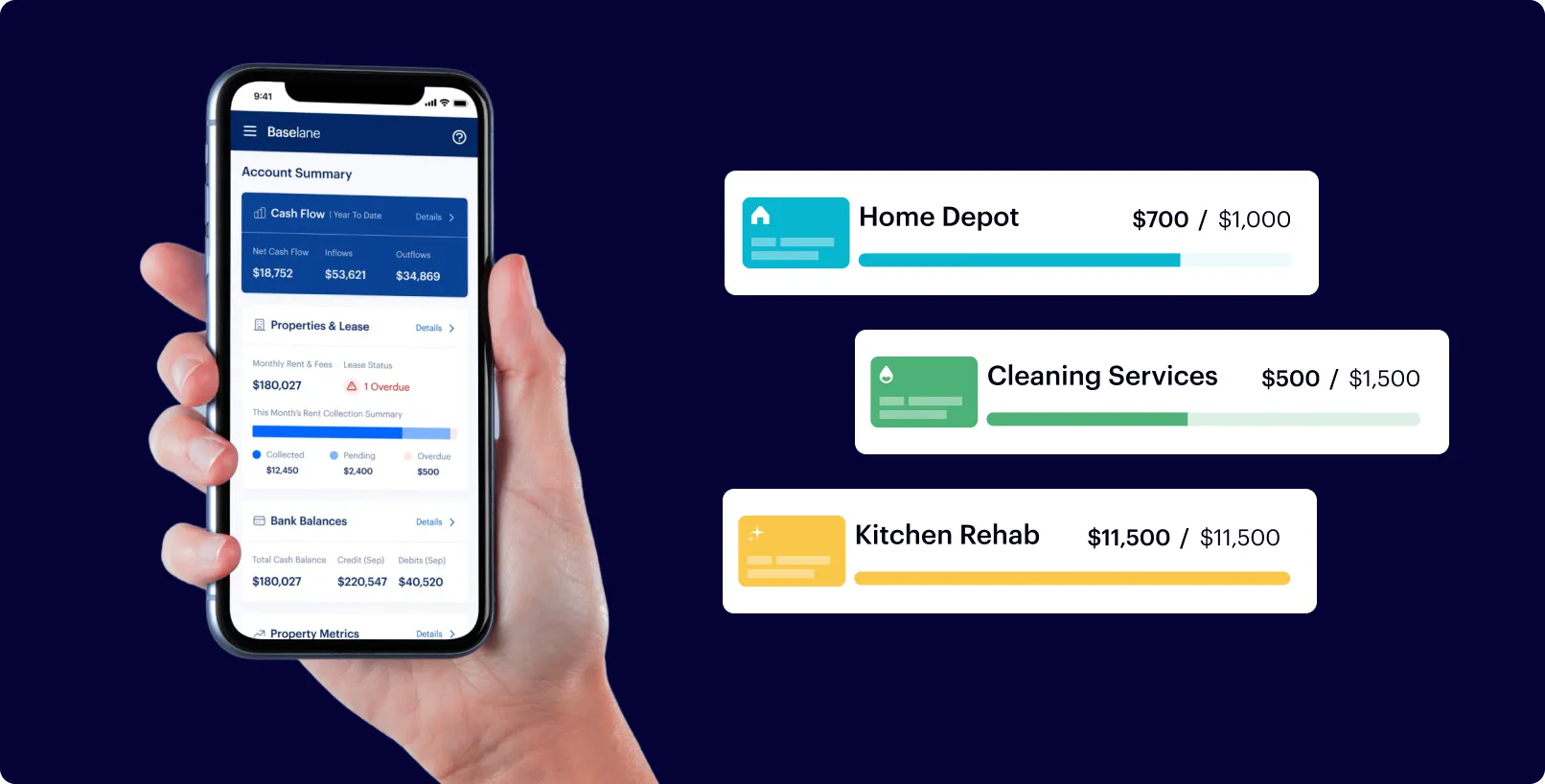Managing rental properties often involves unexpected costs, from sudden repairs to vacant periods. Having readily accessible funds is crucial for navigating these challenges without derailing your financial goals. A dedicated cash reserve account provides the necessary safety net for your rental property investments.
Key takeaways
- A cash reserve account for rental property funds helps cover unexpected costs like repairs and vacancies.
- Landlords need sufficient reserves to protect investments and meet potential lender requirements.
- High-yield accounts with easy access and FDIC insurance are ideal for holding cash reserves.
- Setting up separate accounts or sub-accounts per property simplifies reserve management and tracking.
- Landlord-specific financial platforms offer integrated tools that can streamline managing both reserves and operating funds.
What is a cash reserve account for rental property landlords?
A cash reserve account is a financial buffer designed specifically for rental property expenses that fall outside regular monthly operations. Think of it as a strategic emergency fund for rental property investments. This property reserve ensures you have funds readily available for planned and unplanned costs.
The primary goal of a cash reserve fund is to provide liquidity when you need it most. This differs slightly from a standard savings account, which might have withdrawal limits or penalties designed to discourage frequent access. A cash reserve vs. savings account prioritizing liquidity and sometimes earning potential is key for landlords.
How does a cash reserve work for landlords?
Cash reserve accounts work like most bank accounts. You deposit money regularly or as needed, building up a balance intended only for specific property-related uses. These funds are kept separate from your personal or even your property's operating cash flow reserve.
Why landlords need a dedicated cash reserve
Managing rental properties comes with unpredictable costs and fluctuating income. That’s why maintaining an investment property cash reserve, including a cash reserve for mortgage payments, is essential for long-term financial stability. Choosing an account with a strong cash reserve rate also helps maximize returns while keeping funds accessible.
- Stability and peace of mind: An investment property cash reserve ensures you can cover expenses without tapping personal savings or relying on high-interest debt.
- Emergency repairs: Serves as a rental property repair reserve to protect your asset and keep tenants satisfied.
- Maintenance reserve: Acts as a maintenance reserve for rental property repairs, vital for unexpected issues like a broken furnace or roof leak.
- Vacancy coverage: Investment property reserves help cover mortgage, taxes, and insurance during tenant turnover.
- Capital improvements: Functions as a replacement reserve real estate fund for planned expenses like HVAC replacements or renovations.
- Lender requirements: Some lenders require an investment property cash reserve to ensure you can manage expenses during slow periods.
In some cases, maintaining investment property reserve requirements might be a condition of your mortgage lender. Lenders want assurance that you can cover costs even during lean times, protecting their investment.
How much cash reserve should you have?
If you’re wondering, ‘how much cash reserve I should have?’, there isn't one single answer, but several common calculation methods exist. Recommendations often range from three to six months' rent per unit or $5,000 per property.
Some sources suggest setting aside 6-8% of monthly rent or 10% of monthly income. More conservative investors might allocate 15-30% of gross rent each month with no upper limit. These methods help you calculate the cash reserve ratio relative to your income or expenses.
Factors influencing your property management reserve fund needs include property age, location (cost of repairs varies), and portfolio size. Older properties typically require a larger maintenance reserve for rental property funds. Understanding these factors is key to calculating reserves for investment property overall.
Setting up automatic contributions to your reserve account is an effective strategy. This automatic cash reserve payment ensures consistent growth of your fund without needing manual transfers every month.
Essential features of the best cash reserve accounts for landlords
Look for these must-have features when choosing an account to hold reserves for rental property:
- Accessibility and liquidity: Funds must be easily accessible with no withdrawal penalties. An emergency cash reserve should be available instantly for urgent repairs or vacancies.
- Competitive yield: Choose accounts with high APY (Annual Percentage Yield). A high-yield savings account or business cash reserve account with a solid cash reserve interest rate helps your money grow while staying liquid.
- Landlord-focused account types: Look for business bank accounts for rental property that offer features like sub-accounts, making it easy to manage reserves by property.
- Streamlined financial management: Sub-accounts allow for better tracking, budgeting, and reporting, ideal for managing multiple units and separating operational vs. reserve funds.
- Integrated tools: Landlord-specific platforms often combine reserve accounts with rent collection, bookkeeping, and cash reserve online banking, all in one place.
- Separate finances: Helps reinforce the distinction between a business bank account vs. a personal bank account, which is key for clean records and legal protection.
- No unnecessary fees: Look for accounts with no monthly fees or minimum balance requirements. No-fee bank accounts help maximize available reserve funds.
Baselane’s banking platform offers unlimited sub-accounts with no monthly fees, ideal for setting up dedicated reserves per property and managing your emergency cash reserve alongside operating funds.
Best cash reserve accounts and platforms for landlords
Choosing the best cash reserve account depends on how you manage your rental finances. While traditional banks provide basic business checking or savings options, landlord-specific banking platforms offer features tailored for real estate investors, including:
- Separate accounts for each property
- Higher APY to grow your reserves
- Built-in tools for rent collection, expense tracking, and managing your emergency cash reserve
By contrast, traditional banks tend to offer lower APY rates and no support for property-level tracking. Accounting features often require third-party tools.
Here’s a breakdown of key features for popular landlord-specific platforms:
Traditional banks like Chase, Capital One, and U.S. Bank offer more familiar options, but often lack rental-specific tools or competitive interest rates. Here’s how they compare:
Landlords looking for a high yield on investment property cash reserves and integrated tools for managing rental property finances, traditional banks won’t check those boxes.
With no monthly fees, unlimited sub-accounts, and a competitive APY², Baselane is a top contender for the best cash reserve account for rental property owners.
Managing different types of rental property reserves
Managing reserves effectively is essential for long-term rental property success. Separating funds by purpose ensures you’re prepared for both routine expenses and major repairs. Here's a breakdown of the main types of reserves every landlord should maintain:
- Operating reserves: Set aside for short-term, unpredictable expenses like minor repairs, emergency maintenance, or temporary vacancies. Acts as your everyday cash flow buffer.
- Capital reserves: Accumulated over time to fund large-scale improvements or replacements, such as roof replacements or structural upgrades. Key for long-term asset planning.
- Replacement reserves: A subset of capital reserves, specifically earmarked for replacing big-ticket items (e.g., HVAC systems, appliances) based on lifespan and projected cost. Forms the basis of your maintenance reserve for rental property planning.
- Use sub-accounts for better reserve management: Open separate sub-accounts for each reserve type within your banking platform. This helps:
- Keep funds organized
- Avoid misusing capital reserves for operating needs
- Simplify budgeting and reporting
Open a high-yield cash reserve account with Baselane
Building and maintaining a strong cash reserve is essential to running a successful rental property business, and the right banking solution makes all the difference. Baselane banking is purpose-built for real estate investors, offering:
- Unlimited sub-accounts to segment reserves by property or purpose
- Competitive [v="apyvalue"] APY² to grow your funds
- No account fees or minimum balance requirements
- Integrated bookkeeping for auto-expense tracking
Baselane goes beyond banking, offering automated rent collection, tenant screening, cash flow analytics, insurance, and even rental property loans – it’s a full-stack financial platform designed to simplify every aspect of property management. Create your free account today.
FAQs
How much cash reserve should I have for a rental property?
Common recommendations for rental property cash reserves range from three to six months' rent per unit or $5,000 per property. Some methods suggest reserving 6-10% of your monthly rental income.
What type of bank account is best for rental property reserves?
High-yield savings accounts or money market accounts are generally best. They offer a balance of liquidity and the ability to earn interest while keeping funds separate and secure with FDIC insurance.
What is the difference between a cash reserve and a savings account?
While often similar, a cash reserve account is specifically designated for unexpected or future planned expenses, prioritizing quick access (liquidity) for those specific needs. A regular savings account might have withdrawal limits.
Do I need a separate bank account for each rental property?
Using separate business bank accounts or virtual sub-accounts for each property is highly recommended. It simplifies tracking income, expenses, and reserves per property, aids budgeting, and makes tax preparation easier.
Are landlord cash reserve accounts FDIC-insured?
Yes, funds held in bank accounts (including business accounts and some financial platforms that partner with banks) are typically FDIC-insured.















.jpg)

